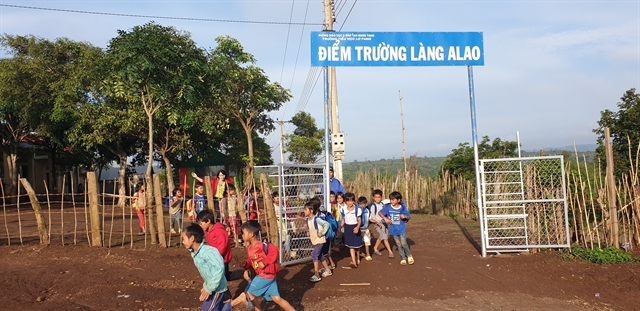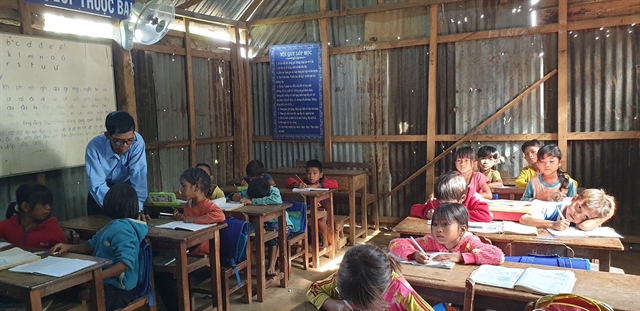 Features
Features

A deep desire to help poor Bahnar ethnic minority children motivates Chhỡi, a teacher in Blên Village, Lơ Pang Commune in the central highlands’ Gia Lai province, to devote himself to education.
by Hồng Điệp
A deep desire to help poor ethnic Bahnar children motivates Chhỡi, a teacher in Blên Village, Lơ Pang Commune in the Central Highlands’ Gia Lai Province, to devote himself to education.
Now 56, he has spent more than 35 years sharing his knowledge with children in Mang Yang District.

|
| OUT OF CLASS: Students at the Alao shool point enjoy play-time. VNA/VNS Photo Hồng Điệp |
Despite the fact he is approaching retirement, he remains enthusiastic and willing to overcome any and all hardships to be in the classroom every day and night.
He never tires of supporting his students in their studies, and hopes to help them change their lives with knowledge gained in his lessons.
“I am set to retire at 60,” Chhỡi said. “My health is not what it used to be but is not a problem. I will teach until the end of my days.”
He began teaching in 1985 and since then has helped many generations of students at Lơ Pang Primary School to read and write.
Some of his former students have gone on to become teachers themselves, some giving up better jobs in the city to return home and do as Chhỡi has done.

|
| POWER OF PERSUASION: Chhỡi (left) must convince the parents of his students to allow them to attend school.VNA/VNS Photo Hồng Điệp |
The chief of Blên Village, Thĩ, was once one of his students and then followed in his footsteps, becoming a teacher at Lơ Pang Primary School.
“I remember Chhỡi was always full of enthusiasm and he passed that on to my friends and I, who are now in the commune to do teaching,” he said.
After a long period teaching at the local school, Thĩ started working in administration and was elected as village chief. One of his main goals is to increase awareness among the villagers about the importance of schooling and to support the provision of education.
“Villagers used to only think about whether they had enough food for the day, so disregarded the need to study,” he said. “They must change their thinking, and Chhỡi is helping them look at education differently. Learning how to read and write will take them out of poverty.”
Lơ Pang Primary School actually has six small facilities called “sub-school” in different villages around the commune.
The Pyầu sub-school - the nearest at 12km from the main school - is where Chhỡi taught for ten years from 2000 to 2010.
Getting to the school used to involve a 20-km walk every day along rocky jungle paths. Many teachers preferred to begin their working week on Sunday afternoon, arriving in the village late at night and sleeping in a local home before teaching first thing on Monday morning. On Friday afternoon, after classes had ended, they would head back along the rocky path to spend the weekend with their families.
“A road to the sub-school was built in 2010 but it didn’t really help because it was on a slope and was easily damaged whenever it rained heavily,” Chhỡi remembered.
The road was dangerous and riding a motorbike was difficult because it was so muddy.
He fell off many times while riding along the road, but that never stopped him teaching.
Then, finally, a concrete road was built last year and travel has become much easier. “The new road has eased the hardship facing teachers,” Chhỡi said.
Hănh, a Grade 5 student at Lơ Pang school, said he liked Chhỡi’s lessons as "they open up a new world" to him.
“He has helped me realise I can have a bright future and has inspired me with new dreams,” he said. “For many years he has encouraged my friends and me not to drop out of school. My parents listened to him, and have allowed me to stay in school. I will study as best I can, in tribute to my teacher.”
Hănh has dreamed of also following in Chhỡi footsteps and becoming a teacher, fulfilling his own desire to teach children in poor villages.
Chhỡi also teaches at other sub-schools in Lơ Pang Commune.
They all suffer from the same poor conditions Pyầu sub-school must cope with, including bad roads and low awareness among the local community about the importance of schooling.
To better teach his students and move up in his career, Chhỡi undertook further studies at the Teachers’ Training College in the provincial capital Pleiku.
Upon finishing, he returned to the commune and began working as teacher at Alao sub-school in Alao Village, where he’s been for two years.
The students at Alao all love him, as he comes to all of their homes in the morning, no matter rain or shine, to convince their parents to let them come to school rather than working in the fields, as is the custom in ethnic families.
In the early days of each school year, Chhỡi and many of the other teachers go out to the fields to persuade parents to let their children attend school. They are now also supporting the children by providing them with breakfast each day and warm clothing in winter.
“This is a good way for the parents to feel okay about letting their children continue to go to school,” he said.
The parents of one student said they were happy to let Chhỡi take care of their child and had agreed to let him continue his studies.
Vũ Thị Hợi, deputy principal at Lơ Pang Primary School, greatly appreciates Chhỡi’s contribution to educating local children, saying his devotion over more than 35 years sets a glowing example for the other teachers.
“Chhỡi has overcome many challenges to help eradicate illiteracy in remote and mountainous villages, winning the love and respect of his colleagues and students by doing so,” Hợi said.

|
| DAYS OF STUDY: Poor Bahnar minority students learning in the classroom. VNA/VNS Photo Hồng Điệp |
“Teaching is a noble profession, and teachers in remote areas deserve even more respect. Without teachers like Chhỡi, ethnic communities in remote villages could never improve their circumstances.”
All of the teachers have helped life in remote parts of Gia Lai Province by spreading knowledge, Hợi added, and the example set by Chhỡi encourages younger teachers to do what they can to promote the importance of schooling in the community. VNS




